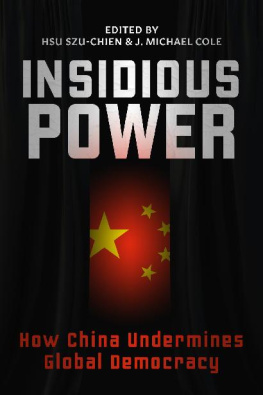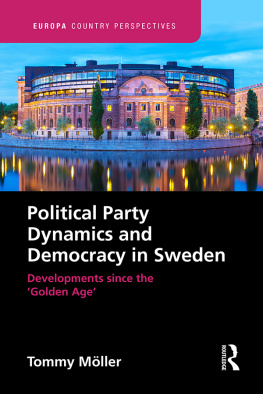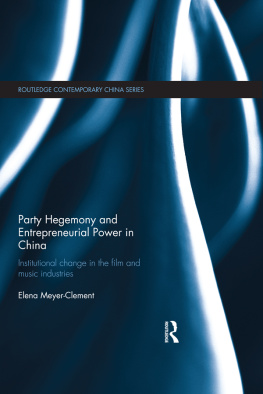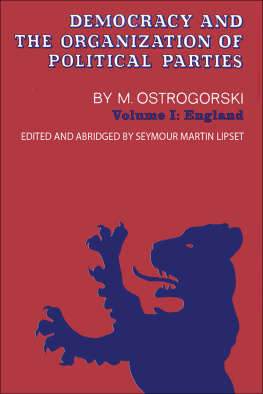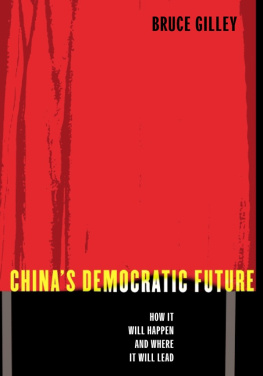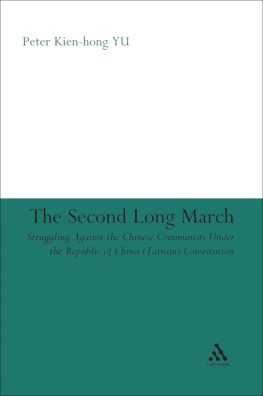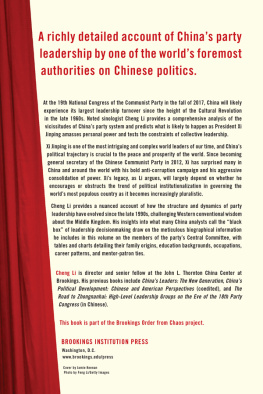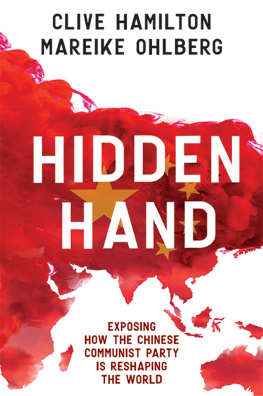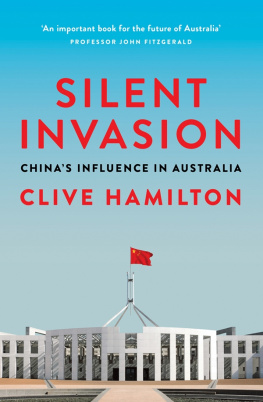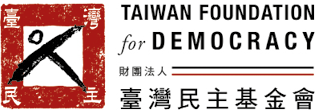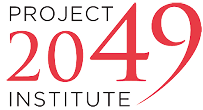Insidious Power
Insidious Power
How China Undermines
Global Democracy
Edited by
Hsu Szu-chien and J. Michael Cole
An Eastbridge book
To the brave men and women who refuse to be silenced by the authoritarian forces whose insidious activities they seek to turn a spotlight on
Published by Eastbridge Books, an imprint of Camphor Press Ltd
83 Ducie Street, Manchester, M1 2JQ
United Kingdom
Copyright 2020 Camphor Press.
All rights reserved. This book or any portion thereof may not be reproduced or used in any manner whatsoever without the express written permission of the publisher except for the use of brief quotations in a book review.
isbn 978-1-78869-213-7 (paperback)
978-1-78869-214-4 (hardcover)
The moral right of the author has been asserted.
Set in 11 pt Linux Libertine
Except in the United States of America, this book is sold subject to the condition that it shall not, by way of trade or otherwise, be lent, re-sold, hired out, or otherwise circulated without the publishers prior consent in any form if binding or cover other than that in which it is published and without a similar condition including this condition being imposed on the subsequent purchaser.
Foreword
Aaron Friedberg
The essays in this volume reveal the extent to which the Chinese Communist Party (CCP) is today waging a sophisticated and sustained campaign of political warfare against democratic nations, both large and small.
The CCPs use of political warfare or influence operations is, of course, nothing new. Mao Zedong () and his colleagues developed and refined an array of united front tactics for uniting with friends and disintegrating enemies during their long march to power, and continued to deploy them to cultivate friends of China in the West following the establishment of the Peoples Republic of China (PRC). Opportunities for access and the exertion of influence increased with the normalization of diplomatic relations with the United States and other Western nations during the 1970s, and expanded even more dramatically once the program of reform and opening up began to take hold under Deng Xiaoping (), launching the Chinese economy onto its steep upward trajectory.
Beijing relied on its old friends and its newfound allies in the business community to help work its way back into the Wests good graces following the Tiananmen Square massacre and, ten years later, to assist it in gaining access to the World Trade Organization (WTO). Throughout this period and into the early years of the new century, the CCP also sought to convince Western observers that the strategy of engagement was succeeding and that, Tiananmen notwithstanding, China was moving inexorably toward eventual economic and political liberalization. And Beijing worked tirelessly to dispel the so-called China threat theory, isolating and if possible discrediting those who warned against the potentially dangerous implications of its growing power.
Using a wide variety of channels and mechanisms to deliver its messages, the CCP sought to shape the perceptions of foreign elites (and, to a lesser extent, foreign publics), and through them, the policies of their governments. These activities had three broad goals: ensuring that other countries would continue to assist Chinas economic development by providing it with capital, technology, and markets; discouraging actions that might threaten the CCP regimes legitimacy or interfere with its ability to achieve its other domestic and foreign policy objectives (and encouraging actions by other countries that could be supportive); and forestalling a forceful, coordinated collective response to Chinas rise.
Although there has been considerable continuity in both goals and methods, under Xi Jinping () the CCPs political influence operations have received an undeniable infusion of new energy, attention, and resources. This should come as no surprise. As the PRC abandons any pretense of hiding capabilities and biding time it has also ramped up the use of influence operations to ease resistance to its growing assertiveness and its increasingly evident ambitions. Once primarily a weapon of the weak, used to divide and fend off stronger opponents, political warfare is now being deployed to help China regain its place as the dominant power in eastern Eurasia and to mount a challenge to the global preponderance of the United States.
In a September 2014 speech, Xi, quoting Chairman Mao, referred to united front work as one of the CCPs three magic weapons, equal in importance to a strong party and a capable military. This formulation is notable for what it reveals about Xis priorities and his views on what will be needed to achieve the China dream of national rejuvenation. But it also points to an anomaly in much Western analysis. In contrast to the other two pillars of party power, at least until quite recently, political warfare has received comparatively little attention. There are a number of reasons for this. The CCPs wide-ranging influence operations are, by design, secretive and often highly deceptive, with their inner workings concealed behind a confusing maze of front organizations, ranks of witting and unwitting intermediaries, and clouds of bland rhetoric. The topic is also a sensitive one: allegations that Beijing is seeking to shape the words, deeds, and beliefs of its foreign targets are often met with angry denials; counter-accusations of McCarthyism, anti-Chinese bias, or racial prejudice; and sometimes with the cynical retort that China is merely doing what other nations do to advance their own interests.
Notwithstanding these obstacles, in the last few years a small handful of scholars, journalists, and independent analysts have begun to peel back the layers of obfuscation and deceit that surround the CCPs influence operations, exposing their breadth, depth, and strategic intent in one country after another. Although the picture is by no means complete, and while the details vary from case to case, what is emerging is a recurrent pattern of aggressive, well-funded, highly organized, and centrally directed efforts to penetrate and manipulate the societies and political systems of democracies in Asia, Europe, and North America, as well as parts of the developing world.
This work is difficult; it requires an unusual mix of linguistic and forensic skills, as well as a firm grasp on the history, ideology, and complex internal mechanics of the CCP. In contrast to most academic endeavors, researching this topic also demands a measure of personal courage; many of the pioneers in this field, including the authors of several of the essays in this collection, have been subject to scurrilous allegations, legal threats, and even physical harassment.
As the resistance it has already encountered may suggest, further research on the CCPs influence operations is of the utmost practical importance. These operations are insidious; they seek to exploit the openness of free societies, turning one of their greatest sources of strength into a strategic vulnerability. The challenge confronting democratic governments is to find ways of countering Beijings efforts without sacrificing the values and principles on which they are based. In some cases, tougher laws and new regulations will be necessary. Just as important, and in the long run more effective, however, will be heightened awareness and increased vigilance on the part of the CCPs intended targets: journalists, business executives, academics, think tankers, ordinary citizens, and their elected representatives. As always, the best antidote to corruption and attempted subversion is sunshine. This volume provides a healthy initial dose; much more will be required.
Next page
